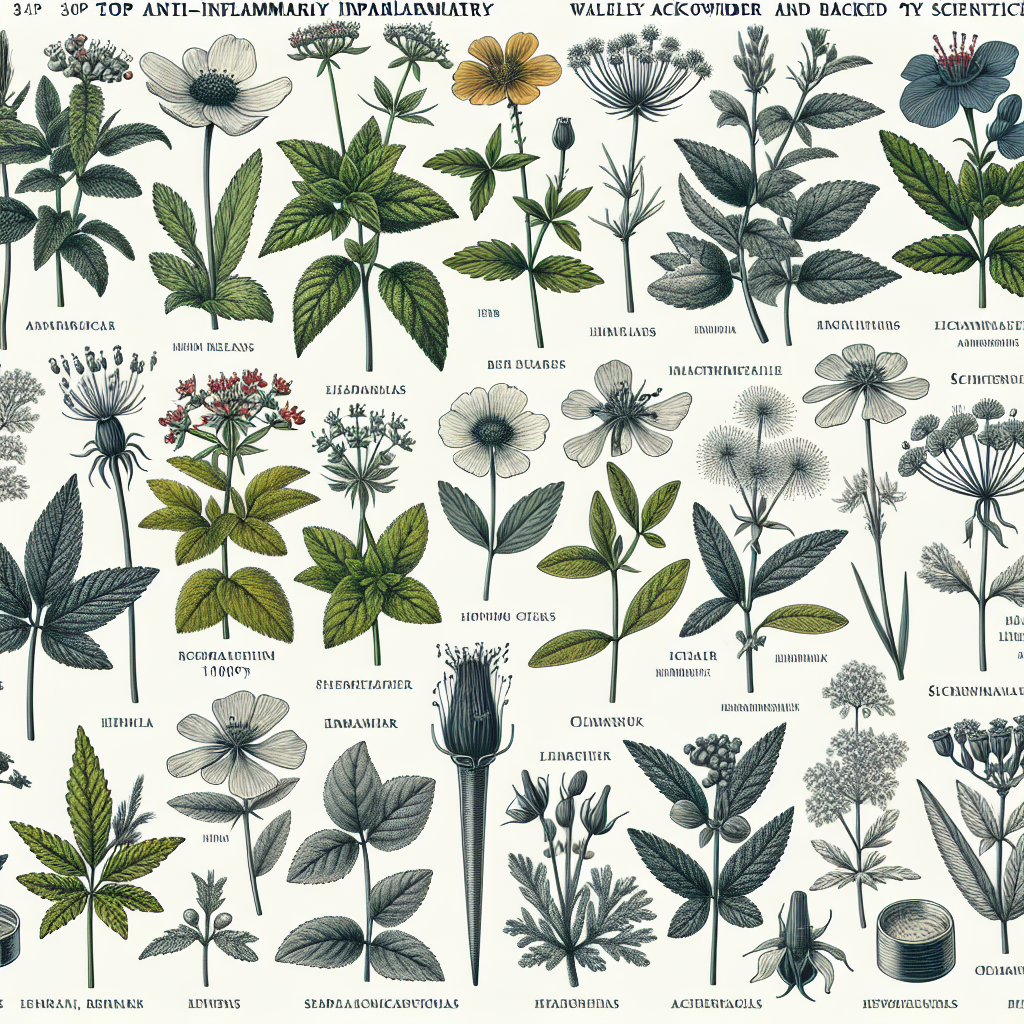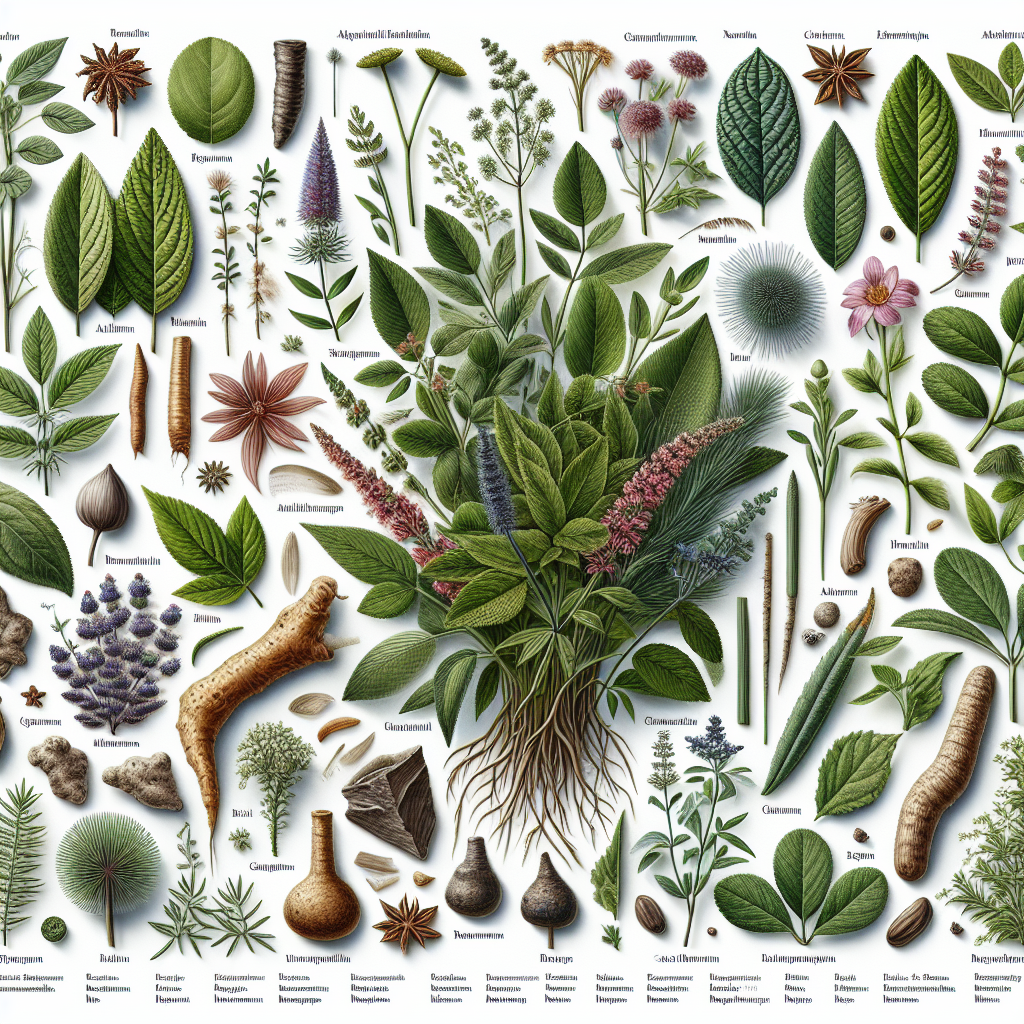Top Anti-Inflammatory Herbs Backed by Science

Discover the top anti-inflammatory herbs backed by science now! Boost your health and wellness with nature’s best. Visit My Vibrant Vitality today.
Exploring the Top 3 Anti-Inflammatory Herbs Proven by Science
In the realm of natural health and wellness, the use of herbs as a means to combat inflammation has been a long-standing practice. However, it is only in recent years that science has begun to validate the efficacy of these natural remedies. Among the myriad of herbs available, three stand out for their potent anti-inflammatory properties: turmeric, ginger, and rosemary. These herbs, backed by scientific research, offer a natural alternative to conventional anti-inflammatory drugs, often without the associated side effects.
Turmeric, a vibrant yellow spice native to Southeast Asia, has been used for centuries in traditional medicine. The active compound in turmeric, curcumin, is responsible for its anti-inflammatory effects. Numerous studies have demonstrated curcumin’s ability to inhibit the production of inflammatory cytokines, proteins that promote inflammation in the body. A 2017 review published in the Journal of Medicinal Food found that curcumin could effectively reduce inflammation in individuals with osteoarthritis. Moreover, curcumin’s anti-inflammatory properties have been shown to be comparable to those of some anti-inflammatory drugs, without the typical side effects.
Next on the list is ginger, a pungent root that has been used in cooking and medicine for thousands of years. Ginger contains a variety of compounds with anti-inflammatory properties, including gingerols and shogaols. These compounds work by blocking the production of substances that trigger inflammation in the body. A 2013 study published in the journal Arthritis found that a specialized ginger extract reduced inflammatory reactions in rheumatoid arthritis patients as effectively as steroids did. Furthermore, a 2015 review of 16 clinical trials in the Journal of Pain found that 2 grams of ginger per day significantly reduced muscle pain caused by exercise-induced inflammation.
Lastly, rosemary, a fragrant herb commonly used in cooking, also boasts impressive anti-inflammatory benefits. The active compounds in rosemary, including rosmarinic acid and carnosic acid, have been shown to have potent anti-inflammatory and antioxidant effects. A 2011 study published in the Journal of Medicinal Food found that these compounds inhibited the production of inflammatory cytokines, thereby reducing inflammation. Additionally, a 2016 study in the Journal of Neuroinflammation found that carnosic acid could protect against neuroinflammation, a key factor in neurodegenerative diseases like Alzheimer’s and Parkinson’s.
In conclusion, turmeric, ginger, and rosemary are three herbs that have been scientifically proven to possess potent anti-inflammatory properties. Incorporating these herbs into your diet could provide a natural and effective way to combat inflammation. However, it’s important to remember that while these herbs can help manage inflammation, they should not replace conventional medical treatment. Always consult with a healthcare professional before starting any new treatment regimen. As science continues to explore the healing power of nature, it is clear that these herbs will continue to play a significant role in the fight against inflammation.
Science-Backed Anti-Inflammatory Herbs: A Comprehensive Guide

In the realm of natural health and wellness, the use of herbs as a means to combat inflammation has been a long-standing practice. However, it is only in recent years that science has begun to validate the anti-inflammatory properties of certain herbs. This article will delve into the top anti-inflammatory herbs that have been backed by scientific research, providing a comprehensive guide for those seeking natural alternatives to conventional anti-inflammatory medications.
First on the list is turmeric, a golden spice that has been used in traditional Indian medicine for centuries. The active ingredient in turmeric, curcumin, has been extensively studied for its potent anti-inflammatory effects. A study published in the Journal of Alternative and Complementary Medicine found that curcumin was as effective as ibuprofen in reducing pain and inflammation in patients with osteoarthritis. Moreover, curcumin has been shown to inhibit the production of inflammatory cytokines, which are proteins that promote inflammation in the body.
Next, we have ginger, a root that is commonly used in cooking and as a natural remedy for various ailments. Ginger contains compounds called gingerols and shogaols, which have been found to have anti-inflammatory and antioxidant properties. A review of studies published in the International Journal of Preventive Medicine concluded that ginger supplementation significantly reduces inflammatory markers in the body.
Another herb that has been scientifically proven to have anti-inflammatory properties is rosemary. This aromatic herb contains a compound called rosmarinic acid, which has been shown to suppress inflammatory responses. A study published in the Journal of Medicinal Food found that rosmarinic acid reduced inflammation and pain in rats with arthritis.
Green tea, while not technically an herb, is worth mentioning due to its powerful anti-inflammatory properties. The active compound in green tea, epigallocatechin-3-gallate (EGCG), has been found to inhibit inflammation by reducing the production of pro-inflammatory cytokines. A study published in the American Journal of Clinical Nutrition found that regular consumption of green tea significantly reduced markers of systemic inflammation.
Lastly, we have boswellia, also known as Indian frankincense. This herb has been used in Ayurvedic medicine for centuries to treat inflammatory conditions. The active compounds in boswellia, known as boswellic acids, have been shown to inhibit the production of leukotrienes, which are molecules that cause inflammation. A review of studies published in the Journal of Ethnopharmacology concluded that boswellia has potent anti-inflammatory and analgesic properties.
In conclusion, the use of herbs as a natural means to combat inflammation is not only a practice steeped in tradition but also one that is increasingly being validated by scientific research. Turmeric, ginger, rosemary, green tea, and boswellia are just a few examples of herbs that have been scientifically proven to have potent anti-inflammatory properties. However, it’s important to note that while these herbs can help reduce inflammation, they should not replace conventional medical treatment. Always consult with a healthcare professional before starting any new supplement regimen.
Unveiling the Power of Top Anti-Inflammatory Herbs: A Scientific Perspective
In the realm of natural health and wellness, the power of herbs is undeniable. Among the myriad of benefits they offer, their anti-inflammatory properties are particularly noteworthy. Inflammation, a natural response of the body to injury or illness, can become chronic and lead to serious health issues when not properly managed. Fortunately, nature has provided us with a plethora of herbs that can help combat inflammation. This article will delve into the science-backed anti-inflammatory herbs that are making waves in the health community.
Turmeric, a golden spice native to Southeast Asia, is at the forefront of anti-inflammatory herbs. Curcumin, the active compound in turmeric, has been extensively studied for its potent anti-inflammatory effects. A review published in the Journal of Alternative and Complementary Medicine found that curcumin is as effective as some anti-inflammatory drugs, without the side effects. It inhibits the activity of several enzymes involved in inflammation, making it a powerful tool in managing conditions like arthritis, heart disease, and inflammatory bowel disease.
Next on the list is ginger, a spice that has been used for centuries in traditional medicine. Ginger contains gingerols and shogaols, compounds that have been shown to have anti-inflammatory and antioxidant effects. A study published in the International Journal of Preventive Medicine found that ginger supplementation significantly reduced inflammatory markers in participants. This makes ginger a promising natural remedy for inflammatory conditions.
Another herb that has been gaining attention for its anti-inflammatory properties is green tea. Rich in polyphenols, particularly epigallocatechin gallate (EGCG), green tea has been shown to reduce inflammation and protect cells from damage that can lead to chronic diseases. A study in the European Journal of Clinical Nutrition found that green tea consumption was associated with reduced inflammation markers. This suggests that regular consumption of green tea could help manage inflammation and prevent related health issues.
Rosemary, a fragrant herb commonly used in cooking, also boasts impressive anti-inflammatory benefits. It contains rosmarinic acid and carnosic acid, compounds that have been shown to inhibit the production of inflammatory enzymes. A study in the Journal of Medicinal Food found that rosemary extract significantly reduced inflammation in test subjects. This makes rosemary a potential natural solution for managing inflammation.
Lastly, we have the humble garlic, a staple in many kitchens. Garlic contains allicin, a compound that has been shown to have potent anti-inflammatory effects. A study published in the Journal of Medicinal Food found that garlic extract significantly reduced inflammation markers in participants. This suggests that regular consumption of garlic could help manage inflammation and prevent related health issues.
In conclusion, the power of herbs in managing inflammation is backed by science. Turmeric, ginger, green tea, rosemary, and garlic are just a few examples of herbs that have been shown to have potent anti-inflammatory effects. Incorporating these herbs into your diet could help manage inflammation and promote overall health. However, it’s important to remember that while these herbs can help manage inflammation, they should not replace medical treatment. Always consult with a healthcare professional before starting any new health regimen.